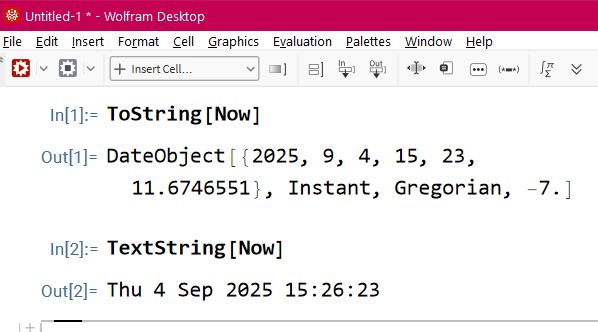Wolfram: Convert to String
ToString
ToString[expr,form]-
return a string, formatted using form.
🟢 TIP: use
InputFormas second argument. That is the most useful.ToString[x^2, InputForm] === "x^2" (* True *) (* number to string *) ToString[3, InputForm] === "3" (* True *) (* number to string *) ToString[123.456, InputForm] === "123.456" (* True *) (* fraction *) ToString[2/3, InputForm] (* 2/3 *) (* convert fraction to machine number first *) ToString[N[2/3], InputForm] (* 0.6666666666666666 *) (* convert symbolic constant to number first *) ToString[N[Pi] , InputForm] (* 3.141592653589793 *) ToString[expr]-
Convert number or any expression to string, formatted using
OutputForm. Basically, 2-dimensional ASCII text for human to read.ToString[ 8.23 ] === "8.23" (* True *) ToString[ {1,2,3} ] === "{1, 2, 3}" (* True *) ToString[x^2] === " 2 x" (* True *) ToString[x^2/y^3] === " 2 x -- 3 y" (* True *) ToString[ Expand[(x^2/y^3 + y^2)^2] ] === " 4 2 x 2 x 4 -- + ---- + y 6 y y"
Convert Number to String, Controlling Number of Digits
NumberForm-
NumberForm[number, n]NumberForm[number, {n,f}]
show total of n digits, with f in decimal places.
- Show total of n digits
- If total digits is smaller than the number of digits in integer part, warning is shown
most useful options:
NumberPadding -> {"" , "0"}NumberPoint -> "."NumberSeparator -> {",",""}NumberSigns -> {"-", ""}ScientificNotationThreshold -> {-5, 6}
(* convert number to string, controlling total number of digits *) ToString[NumberForm[123.456789, 3] ] (* 123. *) ToString[NumberForm[123.456789, 4] ] (* 123.5 *) (* if total digits is smaller than the number of digits in integer part, warning is shown *) ToString[NumberForm[123.456789, 2], InputForm] (* NumberForm::reqsigz: Requested number precision is lower than number of digits shown; padding with zeros. *) (* 120. *) (* convert number to string. *) ToString[NumberForm[123.456789, {4,2}] ] (* 123.50 *) ToString[NumberForm[123.456789, {4,5}] ] (* 123.50000 *) (* total of 99 digits precision, with 2 decimal places *) ToString[NumberForm[123.456789, {99,2}] ] (* 123.46 *)
TextString (Convert to Human Readable Format)
TextString is designed to convert arbitrary expression or data into a human readable format (as string), including arbitrary data object such as date, geographical data, missing data, etc, and auto omitting parts of a long list by triple dots, and customize list brackets and delimiters, etc.
TextString[Now] (* Thu 4 Sep 2025 15:22:33 *) ToString[Now] (* DateObject[{2025, 9, 4, 15, 22, 42.1365622}, Instant, Gregorian, -7.] *)

Wolfram. Number
Wolfram. String
- Wolfram: String
- Wolfram: String Functions
- Wolfram: Get SubString, by Index
- Wolfram: Get SubString, by Pattern
- Wolfram: Delete SubString
- Wolfram: String Split
- Wolfram: String Join
- Wolfram: String Insert
- Wolfram: Convert to String
- Wolfram: Convert to Binary, Hexadecimal, Base 64, etc.
- Wolfram: String Template
- Wolfram: String Match
- Wolfram: String Replace
- Wolfram: Regular Expression
- Wolfram: String Expression
- Wolfram: StringExpression Pattern Syntax
- Wolfram: RegularExpression vs StringExpression